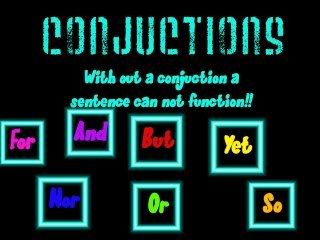
A conjunction joins words, phrases, clauses, or sentences. I think we all know the most common conjunctions and when to use them; and, but, for, or, yet, and so. But here are two conjunctions that always confuse people.
When should you use or and when should you use nor?
Don't let these guys trick you. Remember this simple rule and you'll never be confused again.
When using the word either, us or. They both start with vowels. When using the word neither, use nor. They both start with "n."
Examples:
We had to decide if we were going to either the movies or to dinner.
My boss had neither the time nor the patience to listen to Bill's complaining.
Beginning a Sentence with a Conjunction
Just as there is widespread belief that you should not end a sentence with a preposition, there is also no historical or grammatical foundation that you should not begin a sentence with a coordinating conjunction.
A coordinating conjunction you'll remember is for, and, nor, but, or, yet, so. Once again, I could find no substantial evidence that beginning a sentence with a conjunction is an error and is mainly taught to avoid writing fragmented sentences.
If you decide to begin a sentence with a coordinating conjunction, keep these points in mind:
– Be sure that a main clause follows the coordinating conjunction.
– Use a coordinating conjunction only when it makes the flow of your ideas more effective.
– Do not use a comma after the coordinating conjunction. Coordinating conjunctions are not considered transitional expressions like in addition and for instance.
– But used as an adversative conjunction can sometimes be unclear at the beginning of a sentence. You'll need to evaluate whether the but in question contradicts the preceding statement and see whether and is really the word you want. If and can be substituted, then but is almost certainly the wrong word.
Examples:
He went to work this morning. But he left his briefcase at home.
Between those sentences is an indirect idea, since the two actions are in no way contradictory. What is implied is something like this:
He went to work, intending to give a presentation, but he left his briefcase behind.
Because and would have made sense in the original statement, but is not the right word.
Correct: He went to work this morning. And he left his briefcase at home.
Of course there are other options for structuring this sentence; however this post being about conjunctions, the example uses only conjunctions.

Source: Grammar Done Right!







































































